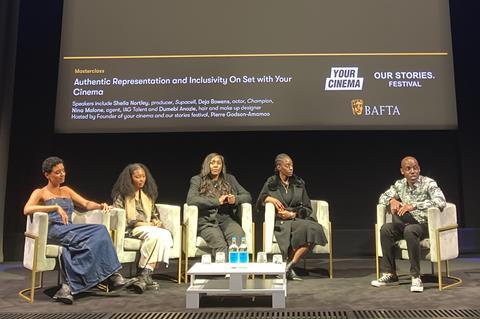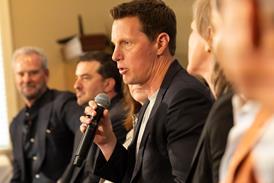
Momentum has been lost in the UK film and TV industry when it comes to commissioning stories that represent Black and Global Majority voices, agreed a panel of Black creatives in an on-stage conversation at Bafta’s London headquarters this week.
There was an initial uplift in 2020 following the rise in the Black Lives Matter movement when the UK industry appeared to recognise the need to be more inclusive. But this introspection has proved short lived.
“I keep hearing the term ‘risk averse’,” said Sheila Nortley, producer of Netflix series Supacell. ”There was a time around Black Lives Matter where it was like – ‘We want everyone to come in, we want to hear your stories, we want diversity and inclusion.’ Now the economy is struggling, people want to return to the ’safe bet’.
”People who have been working here for 30 or 40 years – unfortunately, those people don’t look like us, and those doors start closing again.”
Nortley recently joined Luti Fagbenle’s nascent TV production company Osun Group as head of drama and executive producer.
“How do we keep those doors open, and do so in a way that is sustainable?” Nortley continued. ”One of the ways we do that is encouraging diversity and inclusion at all stages, particularly when it comes to commissioners. I would love to see more Black and Brown people and all underrepresented in those spaces able to greenlight the projects. Sometimes at pitching stage, there’s already a barrier. It starts at the top.”
“Funding is a big thing,” agreed IAG talent agent Nina Malone. “If there could be more diversity in funding and access to pots. A lot of time that’s a barrier. Behind the camera, it’s us all making the effort to make more effort in hiring. We can’t just go to the same places every time. We can’t just use the same pools, use the same people.
”When people say, ‘I can’t find this, I can’t find that,’ You can. All of us in our phones can give you five million examples of these people…. Don’t just pull out a policy change. We all need to uphold what we said we were going to do when Black Lives Matter kicked off. Let’s actually do it now.”
Malone also noted: “I don’t think I’ve ever been on a panel of all Black females.” The panel was titled ’Authentic Representation and Inclusivity On Set’ and delivered in collaboration with Your Cinema, a platform dedicated to showcasing films, documentaries and talent from diverse communities in the UK.
The Black Lives Matter movement became prominent in 2020 after the murder of American man George Floyd at the hands of US police, sparking discussions in North America and the UK about racism.
“Diversity is not a burden”
Diversifying the industry needs to be done in a meaningful way, and not as tokenism, noted actor Déja Bowens, whose credits include BBC series Champion. “Sometimes when I watch particular TV series or films, I can see diversity was an afterthought. I can see where the company went, ‘Oh damn, we haven’t got a [character from an ethnic minority background]. You can actually tell where they’ve started scrambling, looking for ways to be inclusive.”
Bowens suggested with Black actresses in particular, the UK industry seems to have a “one at a time” mindset with who gets the top roles, with the panel pointing towards Letitia Wright and Cynthia Erivo as the current standout stars. “The fact that we can only bring up one or two Black [UK] female actors when we’re giving examples of things should be an indicator there is a problem.”
Make-up designer and artist Dumebi Anozie, whose credits include Barbie, The Silent Twins,Supacell and Channel 4 series Queenie, said she had noticed within her department that while there is increasing progress in TV for people of colour, when it comes to feature films, not enough progress has been made.
“In TV, there are a lot more people of colour working in the industry,” she said. “[But] the higher up you go, when you do feature films like [at] Disney, or Warner Bros, the big blockbuster movies, there are hardly any people of colour. A part of it is – we’re quite new, apart from people like Sharon Martin who have been in the industry for decades. I take my hat off to her, she’s amazing.”
Anozie pointed out support structures need to be in place for individuals entering the industry.
“What we need to do more is get the education. When the George Floyd thing happened, I feel like the doors were open to a lot of hair and make-up artists. But when it came to it, we didn’t have the etiquette, we didn’t have the know-how, like the time sheets, script breakdown, when it came down to understanding the scenes, we didn’t know what we were doing… You can get lost and make mistakes, so then we’re back to ground zero. As much as the door was open, it was open but we didn’t know how to navigate.”
“There wasn’t infrastructure in place,” agreed Nortley. “What I saw was a wave of Black talent coming through, but what I realised as a producer was the safety net [wasn’t there] – when you’re a Black person on set, or the only Black person in production, things may happen and be said, that may be micro-aggressions or not, there needs to be a safe space to speak.”
The panel also noted improving diversity in the industry shouldn’t be viewed as a moral or ethical issue, or a ‘risk’ – it is of commercial benefit as well.
“It starts at the commissioner level, them acknowledging and realising this is not a burden. It’s not an afterthought,” said Nortley. ”It’s not tokenism. It is something that will enrich the film and TV industry. This is something that will rebuild the economy – having stories we haven’t heard from before, from people we haven’t heard from before.”
Nortley has projects in development with Channel 4, Netflix and Fifth Season. “I’m hearing from a few streamers that they are looking for really grounded rom-coms, and I know the truth is, a lot of times Black people are not at the forefront of people’s minds when it comes to romantic comedy. I would love to see us in those spaces as well.”
























No comments yet